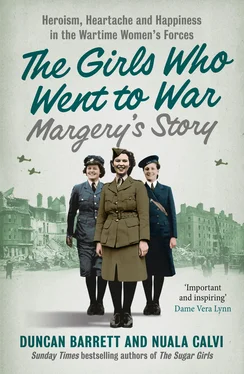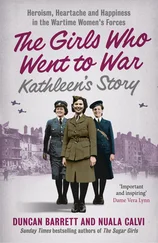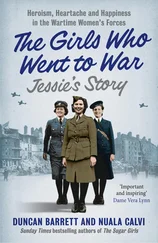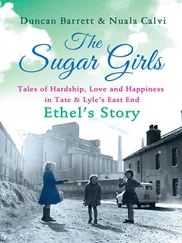Margery was overwhelmed with relief that she had passed her medical. But on her way from Victory House to Paddington Station, suddenly a new thought dawned on her – she had undergone the painful dental work for nothing.
It was getting on for midnight by the time the girls finally arrived at No. 2 WAAF Depot at Innsworth, near Gloucester, the central training facility for new recruits. Having opened only a few months before, the base now managed an intake of almost 3,000 girls a week, and ran like a well-oiled machine.
After the hours of queueing for medical examinations, followed by a lengthy journey, the girls were beginning to feel desperate for a hot dinner and a warm bed, but first there was more processing to be done. They were required to submit to the indignities of the FFI inspection and then to gather their kit from the stores, before making up the beds in their dormitory huts, alternately top to toe to limit the chances of infection. By the time they were finally taken to the mess, Margery was ravenous, but to her disappointment the long-awaited dinner consisted of just a spoonful of watery minced beef and lumpy mashed potato.
As the girls were finishing up their food, one of the kitchen hands came round with a large bucket and Margery saw that she was ladling something from it into their enamel mugs. ‘What’s in there?’ she asked her neighbour.
‘Tea,’ the other girl replied with a smile.
Margery was horrified. After all the unfamiliar, exhausting experiences of the day, the thought of having what should have been a reassuring, homely cuppa doled out from a bucket somehow felt like the last straw.
Finally, the tired recruits were led back to their wooden huts for the night, and collapsed gratefully onto their hard iron beds. But now Margery, like many of the other girls, found that the sleep she had longed for was eluding her. The three square ‘biscuits’ that she had been given for a mattress had a tendency to separate every time she rolled over, and the hard bolster on which her head rested creaked under even the slightest movement. It was a miserable end to a difficult day, and Margery felt more wretched than ever. She thought back to that glossy picture she had seen in her colleague’s magazine, which now seemed very far from the reality of life in the WAAF. She had volunteered out of fear, without really thinking about what she was letting herself in for. Now she began to wonder: What on earth had she done?
That night, Margery wasn’t the only one whose mind was falling prey to such dark thoughts. After the constant bustle of a busy day, now, in the dark and quiet, the girls were suddenly hit by the reality of the decision they had made. She could hear a little sniffle coming from a few beds away, and before long it had turned into stifled sobbing.
Margery tiptoed out of bed and hurried over to her distressed neighbour, who she found weeping into her blanket. The two girls clung to each other in the dark, but before long the noise of crying had set off a third new recruit, and she too came over to sit with them, weeping helplessly. After a while everyone else began sitting up in bed too, and the tears flowed freely all around the hut as the girls shared their fears and feelings of homesickness.
‘Well, at least we’re all going to suffer together!’ said one of them, doing her best to laugh. Suddenly, there were smiles in the hut as well as tears, and the girls began to feel calmer, buoyed by their new-found camaraderie. Eventually, even the hard bolsters and irritating biscuits could no longer stop them from slipping into a much-needed sleep.
But for poor Margery a good night’s rest was not on the cards. A few hours later, she awoke to the taste of blood. Her gum was throbbing where the tooth had been needlessly yanked out the previous day, and when she put her hand up to her mouth it came back sticky and red.
Alarmed, Margery ran over to knock for the sergeant who was sleeping in a private room at the end of the hut, and spluttered an explanation of what had happened. The woman rushed with her across the camp to the sick bay, but on their way they were stopped by a man on guard duty. ‘Halt! Who goes there?’ he demanded, flashing a torch in their direction. As soon as he saw Margery, his jaw dropped in horror, and he stiffened as if he was about to raise the alarm.
‘It’s all right, there hasn’t been an accident,’ the sergeant informed him. ‘She just has a problem with her tooth.’
The guard nodded, relieved, and the two women hurried on.
In the sick-bay, a night-time attendant was on duty. In her time, she must have dealt with all manner of gruesome medical problems, but in the middle of the night, half asleep, she was unprepared for the grisly sight which staggered in. For the last few hours, Margery had been tossing and turning in her uncomfortable bed, and the blood which had seeped out of her mouth was now smeared all over her face. Her hair was thick with the stuff too, and a fresh, dark trickle was oozing down her chin. The poor medic took one look at her and passed out.
Luckily the sergeant had quick reflexes, even in the early hours of the morning. She caught the girl before she hit the floor, narrowly preventing her from becoming the second casualty of Margery’s rushed dental work.
‘I’m so sorry,’ the embarrassed attendant stammered, when she came round a few seconds later.
‘Don’t worry,’ the sergeant told her. ‘It’s her fault for looking so gory.’
Once the sick-bay attendant had recovered a little and drunk a glass of water, she began plugging up the bleeding hole in Margery’s mouth. But after such a mortifying start to her career in the WAAF, Margery only wished there were a hole big enough to swallow her up entirely.
Throughout their training at Innsworth, the new recruits were kept so busy that there was barely time for homesickness, and Margery found that the time flew by faster than she had expected. From the moment each day began, with reveille at 6.30 a.m., to the time they collapsed onto their little iron beds at 10.30 p.m., the girls were constantly chivvied around by sergeants and corporals. Everywhere they went they were marched in groups known as ‘flights’, whether that was to meals, physical training, gas and fire drills, sports practice, injections, lectures on the history of the RAF, classes in first aid and hygiene, or drill practice. But for those who found the routine gruelling there was no prospect of running home to mother – new regulations had recently been passed making the WAAF and the ATS officially part of the armed forces, meaning that absentee recruits could now be charged with desertion.
Before the girls knew it, their three weeks of training were up, and Margery and her hut-mates were separated as they went off to master their various trades. A number of them groaned as they learned that they were destined to be cooks and orderlies, enduring some of the longest working hours in the WAAF. Others heard they would be joining a whole host of different trades, working as admin clerks, teleprinter operators, nursing orderlies, mechanical transport drivers, parachute packers, balloon repairers, dental hygienists, wireless telegraphy slip readers, film projectionists and armament assistants.
As the war progressed, technical trades were beginning to open up to women too, as shortages in manpower compelled the RAF to experiment with a larger female workforce – among the new roles on offer were those of instrument repairers, spark-plug testers and charging-board operators, and in time women would be repairing planes and servicing radar equipment too. Although WAAFs were never actually allowed to serve as aircrew, a small number were lucky enough to receive a transfer to the Air Transport Auxiliary, where more than 100 ‘Attagirls’ got the chance to pilot repaired Spitfires and Hurricanes from factories and maintenance units to airfields around Britain.
Читать дальше












